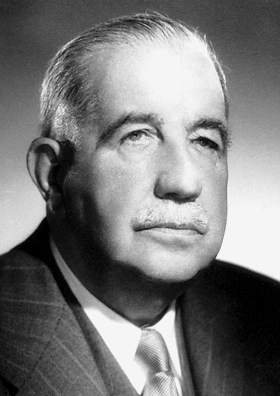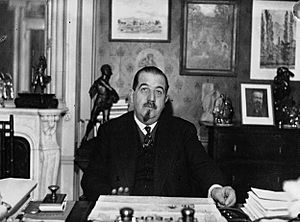Léon Jouhaux facts for kids
Léon Jouhaux (born July 1, 1879 – died April 28, 1954) was an important French leader. He led groups called trade unions. These groups worked to make life better for workers. He even won the Nobel Peace Prize in 1951 for his efforts.
Quick facts for kids
Léon Jouhaux
|
|
|---|---|
 |
|
| Born | 1 July 1879 Pantin, France
|
| Died | 28 April 1954 (aged 74) Paris, France
|
| Resting place | Père Lachaise Cemetery |
| Spouse(s) |
|
| Parent(s) |
|
| Awards | |
Contents
Léon Jouhaux's Story
Léon Jouhaux was born in Pantin, France. His father worked in a match factory. Léon's schooling stopped when his father's pay was cut because of a strike.
Joining the Union
At age sixteen, Léon started working at the same factory. He quickly became an important part of the factory's trade union. In 1900, he joined a strike against a dangerous chemical. This chemical had harmed his father's eyesight. Léon was fired, but later got his job back thanks to the union.
Rising as a Leader
In 1906, Léon was chosen to represent his local union. He joined the General Confederation of Labour (CGT). This was a very big union group in France. His skills helped him quickly move up in the union.
By 1909, he became the main leader of the CGT. He held this important job until 1947.
Fighting for Workers' Rights
As a union leader, Léon Jouhaux fought for many important things. He wanted workers to have an eight-hour day. This meant working only eight hours each day. He also pushed for the right to have a union representative at work. This person would speak for the workers.
Léon also wanted workers to have collective bargaining. This is when workers and bosses talk together to agree on fair pay and rules. He also fought for paid holidays. This meant workers could take time off and still get paid.
Big Wins for Workers
In 1936, a special agreement was made in France. It was called the Matignon Agreement. Léon Jouhaux helped sign this agreement. It gave French workers many of the rights he had fought for.
World War II and Beyond
Before World War II, Léon Jouhaux organized many protests. His union group was against the war. But once the war started, he supported France. He believed that if Nazi Germany won, it would destroy democracy in Europe.
Imprisonment and Freedom
During the war, Léon was arrested. He was sent to a prison camp called Buchenwald concentration camp. Later, he was moved to Castle Itter. In 1945, American and German soldiers freed him during a battle there.
After the war, Léon Jouhaux left the CGT. He started a new union group called Workers' Force (CGT-FO). This group focused on social democracy.
Working for Peace
In 1951, Léon Jouhaux was given the Nobel Peace Prize. This award recognized his hard work for peace.
He also helped create the International Labour Organization (ILO). This group works to improve working conditions around the world. He held high positions in other international union groups too.
Léon Jouhaux passed away in 1954. He was buried in Le Père Lachaise Cemetery in Paris.
Remembering Léon Jouhaux
- Many streets in France are named after him. You can find rue Léon Jouhaux in cities like Aix-en-Provence, Grenoble, and Paris.
See also
 In Spanish: Léon Jouhaux para niños
In Spanish: Léon Jouhaux para niños
 | Leon Lynch |
 | Milton P. Webster |
 | Ferdinand Smith |


